#London Blitz WW2
Text
British Homefront during the Second Word War: The Blitz.
London Blitz. (No source)
The aerial bombardment of British cities was commonly called the Blitz ( 7 September 1940 to 11 May 1941) . The Luftwaffe Blitz on Britain began on the afternoon of 7 September 1940 when 348 German bombers with 617 fighter escorts targeted London during which 430 civilians were killed and 1,600 badly injured and attacks continued on London for the next 57…
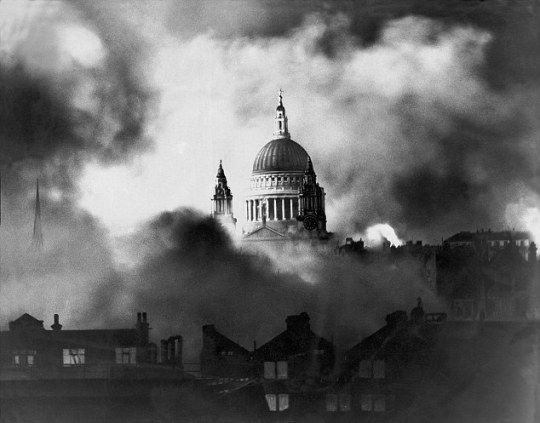
View On WordPress
0 notes
Text

A British rescue worker digs amongst the rubble of a house destroyed during a German air-raid hoping to find survivors - London, England 1941
#world war two#1940s#worldwar2photos#history#ww2 history#ww2#wwii#world war 2#ww2history#wwii era#London#1941#England#the blitz#air raid
164 notes
·
View notes
Photo

National Firefighters Memorial outside St Paul’s Cathedral
The monument was originally intended as a tribute to firefighters during the Blitz on London in World War Two but was extended in 1998 as a memorial to all firefighters in the UK who have died in the line of duty
#memorial#firefighters#monument#blitz#world war two#WW2#cathedral#fire#St Paul's#statue#tribute#history#London#England#UK
71 notes
·
View notes
Text
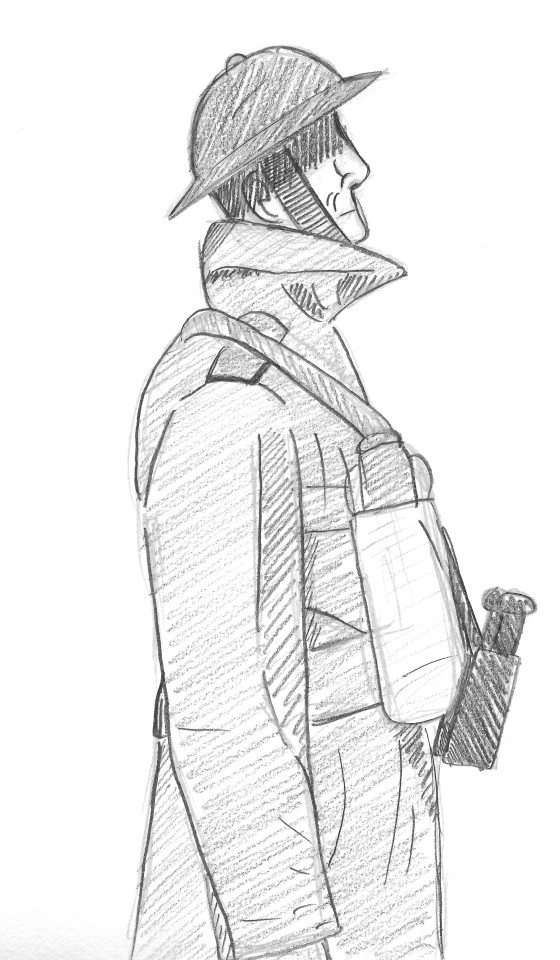
London Lookout
A British soldier on the lookout in London during the Blitz (WW2).
#history#traditional art#warfare#britain#ww2#ww2 art#ww2 history#wwii#soldier#british soldier#gjf#gjf_productions#world war 2#world war two#the blitz#london#UK
12 notes
·
View notes
Text
Evidently, Hitler had forgotten to account for one thing: the quintessential British character.
"Humankind: A Hopeful History" - Rutger Bregman
#book quote#humankind#rutger bregman#hitler#adolf hitler#the blitz#britain#london#nonfiction#ww2#wwii#world war 2#world war ii#world war two#second world war
3 notes
·
View notes
Photo

London from St Paul's Cathedral as it looked in August 1942 by Wolf Suschitzky. “When a war breaks out, people say: "It's too stupid; it can't last long." But though a war may well be "too stupid," that doesn't prevent its lasting. Stupidity has a knack of getting its way; as we should see if we were not always so much wrapped up in ourselves.” - Albert Camus #peace #war #ww2 #London #england #uk #unitedkingdom #ukraine #blitz #theblitz #1940s #photo #photography #photograph #aerialphotography #stpaulscathedral https://www.instagram.com/p/ClvTDr5M3tm/?igshid=NGJjMDIxMWI=
#peace#war#ww2#london#england#uk#unitedkingdom#ukraine#blitz#theblitz#1940s#photo#photography#photograph#aerialphotography#stpaulscathedral
1 note
·
View note
Text
The Ever-forgetful John "Soap" MacTavish,

Who just happens to turn the kitchen tap on during your shower, at the exact point in which you need the release of hot water on your skin, and - as a requiem of British plumbing - it sucks the warmth from the water until you're left shivering, ballooned by half your weight in suds alone, and crouched like a beggar before the shower-head until it returns to lukewarm; at best. Naturally, you've told him time and time over never to put the tap on; never to fill the kettle to boil, never to flush the toilet or wash his hands whenever you needed to clean yourself - it was common decency.
Now, he asserts this would be possible if you kept your showers short, though, you'd learnt by month three of your relationship that what he meant by short was a thirty-second (nary a minute) hop-in, hop-out with a bottle of three-in-one doused, rubbed and subsequently rinsed from every crevace and hair follicle on one's body, as he had done between training sessions, spat at by a man whose impatience rivalled that of WW2 bomber over London during the bloody Blitz.
Anything north of that - thirty-seconds, that is - is free game. Hence, what should have been a thirty-minute 'everything' shower becomes something of an Irish jig, tip-toeing back and forth like a naked man on hot coals, hissing, hoo-ing and hah-ing as you deliberate the numerous ways you might enact a similar torture on him. Hair-dye in his shampoo? Moisturiser instead of toothpaste? Refusal of any and all bathroom-related sex?
It's the thought that plagues your mind as you exit the shower, dissatisfied as if there still exists an itch on your back that can not be reached, that you've been aimlessly swatting at for the duration of your shower, wrapping a hasty towel across your torso to meet him in the kitchen.
You barely sniffle at the wet footsteps along the hardwood floors, though it's exactly the sort of foolishness you'd slap his shoulder for leaving, after you'd so dutifully mopped them the previous week. It'll sink in the grain, don't you know? The wood fibres will pick it up like a sponge in the rain, and you'll be left with damp-smelling floorboards that creak in the summer and crack in the winter, and there'll be no getting those mould stains out!
...Is the sort of vitriol your brain spills as you enter the kitchen, expecting to see Johnny fiddling with the kettle to perfect just the right amount of water for two cuppas - oh, none for him, only two for you, one right after your shower and another, ten minutes after the first.
But he isn't there. He isn't anywhere, in fact. The kettle isn't warm, and there are no used tea bags on the tea bag-catcher, seeping their remaining liquid onto the work surface so it stains.
But there is, however, one long green hospipe trailing from the kitchen tap, hooked taught on its end, out through a crack in the window, through the rear garden. And, whisked away by curiosity, you follow its trail.
There he is.
Watering the plants?
"Johnny?"
He turns. Almost points the hosepipe in the same direction, too, with that giddy smile of his, but he has just enough tact in himself not to do that - not after you've just showered. "Y'cannae be comin' outside in tha', Bonnie, you'll catch yer death!"
"Is this what you've been doing whilst my shower's been running cold?"
Johnny turns into an imbecile with that daft frown on him. Never has a man with such a large brain looked so terribly confused by something so simple. What were you talking about, what he's been doing? Cannae ye see?
"Not quite." His brow furrows. "Oi... I told ye to get back inside, lass. Never mind yous flashin' the neighbours." Then pauses for a moment as he re-adjusts his grip on the hosepipe. "Aye, ye might wanna watch this, though."
And watch, you do.
As he sheds the seriousness from his face, dons a more appropriately pleased smile, lifting the hose up to the neighbours fence - just so that the curve of the water arches over the panels - he sends a fledged stream over top of the boundary.
You're about to shout. Really. You're about to put on your mummy-voice (that's what he calls it), perhaps the only instinct you have in you to shout 'John MacTavish', in the most disappointed tone you can muster - reminds him of his Mam, it does, when he used to steal biscuits out of the biscuit jar when he wasn't supposed to - until he ceases everything that could possibly have warranted it in the first place.
Though, just as your lips part, you watch something black - maybe a dark brown, actually - dart across the stream, rendering it effectively useless in its spread.
Johnny turns to you, eyes wide, mouth agape. "Tha' was a good'un, did ye see that, love?!"
He knows you're confused. He can see it in your eyes.
So he does it again.
And it happens again.
A black - no, it's definitely brown this time, just soddened by the water enough to resemble tar - thing leaps past the spout of water. You can hear it chomping, jingling, panting, and it soon dawns on you what the shadow is;
It's a dog - it's the neighbour's bloody dog.
Johnny waits for your reaction - he hopes it's similar to his: complete awe. Imagine his shock - he was only watering the hedges! But you can only relinquish a sigh and a slightly (emphasis on slight) amused chuckle as you note;
"That's what you've been doing for half an hour whilst I've been in the shower? Playing with the neighbour's dog?"
"Yeah!" He gave the fence another squirt, and sure as the rain, the pup came rumbling after it, jaw agape for maximum bite. "An' I don't even like dogs, but ye cannae be mad at him, look how happy he is!"
And, as you step back through the kitchen with a tired laugh, feet still dripping with water, goosebumps prickled along your skin (and although there will be words to have later in the afternoon), you know his words hold some semblance of truth;
That you can't be mad at him, look how happy he is!

| Masterlist |
#call of duty#call of duty drabble#john soap mactavish#cod drabble#cod#cod fanfic#cod fandom#john mactavish#john soap mctavish x reader#soap drabble#soap fanfic
176 notes
·
View notes
Note
i get that the blitz basically shapes your characterisation of tom, but the way jkr has dumbledore treat tom in canon makes it seem like... did she just not realise he was growing up during ww2? i just FEEL like she intended to make it seem like oh, he only wants to stay at hogwarts because he has no family at home, not because hes literally getting BOMBED 😭
The absence of the cultural impact of WWII in Harry Potter is weird and a constant mystery to me. It's not just Tom's backstory (being set in a period and from a place where this is very relevant) but the entire story for that matter.
Could be she just didn't want to include any of it/didn't want to get into it at all. Which is fair because this is a children's fantasy series that's deliberately set in the 1990's and not about the war (vs. Chronicles of Narnia where Lion, Witch, and the Wardrobe is deliberately set on the premise of "children are sent out of London to mysterious countryside house they've never been to and are exploring" or Bed knobs and Broomsticks which has pretty much the same premise of "children sent away to mysterious household where woman turns out to be a witch")
Except that she then goes on to make very strong parallels between the Death Eaters/Muggle-born Registration act and the Nazis, Dumbledore and Churchill, etc.
So... it feels like she kind of forgot the whole part where Britain was under severe threat of invasion (army across the channel, submarines in the channel) as well as the bombing campaigns particularly against London and how much of the city was destroyed and many people died.
I haven't read any interviews, but this woman is awful with dates and history to begin with so... I'm left wondering if JKR either didn't know. Somehow. Or forgot. Somehow. Or got her dates wrong. Somehow.
The treatment of Tom Riddle definitely seems to be she intended just "oh he's a poor orphan who feels Hogwarts is his home and wants to stay because of that" to parallel with Harry who also wants to stay over the summer and is told no and not, well, de bombs. (Added to this that Dumbledore/JKR never tells us where Tom is sent during the war. Dumbledore implies Tom was just chilling at Wool's the whole time.)
#harry potter#harry potter meta#harry potter headcanon#jk rowling#anti jk rowling#albus dumbledore#tom riddle#meta#headcanon#opinion
149 notes
·
View notes
Text
A nightingale sang in the London Blitz
When exactly was that certain night, the night Aziraphale and Crowley met — and spoke for the first time in 79 years in the midst of the London Blitz?
And what’s the deal with the nightingale’s song, really?
Grab something to drink and we’ll look for some Clues below.
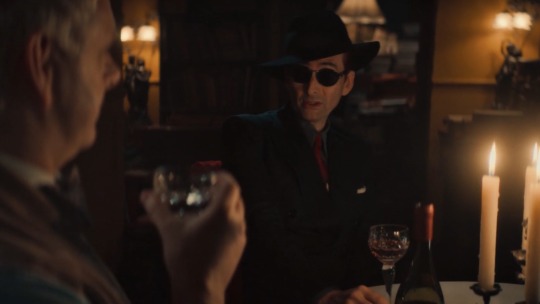
The night they met
The Blitz, short for Blitzkrieg (literally: flash war) was a German aerial bombing campaign on British cities in the WW2, spanning between 7 September 1940 and 10 May 1941. The Luftwaffe attacks were carried out almost non stop, with great intensity meant to force a capitulation and similarly strong impact on British life and culture at the time.
Starting on 7 September 1940, London as the capital city was bombed for nearly 60 consecutive nights. More than one million London houses were destroyed or damaged, and more than 20,000 civilians were killed, half of the total victims of this campaign.
The night of 29 December 1940 saw the most ferocity, becoming what is now known as the Second Great Fire of London. The opening shot of the S2 1941 minisode is a direct reference to recordings of that event, with the miraculously saved St Paul’s Cathedral in the upper left corner.
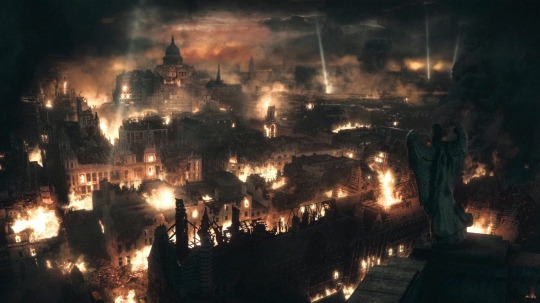
The actual raid lasted between 06:15 and 09:45 PM, but its aftermath continued for days. The old and dense architecture of this particular part of the city turned into a flaming inferno larger than the Great Fire of 1666. Multiple buildings, including churches, were destroyed in just one night by over 100,000 bombs.
Incendiary bombs fell also on St Dunstan-in-the-East church that night, the real-life location of this scene as intended by Neil. It was gutted and again claimed by fire in one of the last air rides on 10 May, when the bomb destroyed the nave and roof and blew out the stained glass windows. The ruins survived to this day as a memorial park to the Blitz.
Such a delightfully Crowley thing to do: saving a bag of books with a demonic miracle adding to the biggest catastrophe for the publishing and book trade in years. 5 million volumes were lost, multiple bookshops and publishing houses destroyed in the December 29th raid alone.
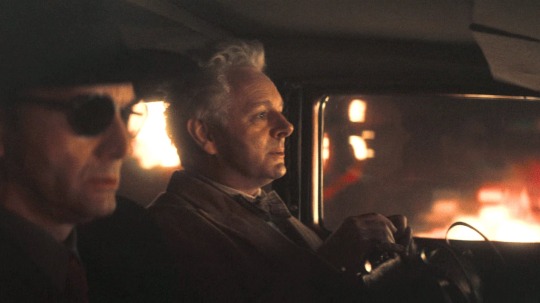
Even without this context, judging by the seemingly unending night, overwhelming cold and darkness, broken heating at the theatre, and seasonal clothing (like Aziraphale and Crowley’s extremely nice winter coats), it’s rather clear that it was the very beginning of the year 1941.
Everything suggests that Aziraphale and Crowley’s Blitz reunion happened exactly 1900 years after their meeting in Rome — which, according to the script book, took place between 1 and 24 January 41 (Crowley was right: emperor Caligula was a mad tyrant and didn't need any additional tempting; there's a reason why he was murdered by his closest advisors, including members of his Praetorian Guard, on 24 January 41).
Interestingly, both events involved a role reversal in their otherwise stable dynamic, with Aziraphale spontaneously taking the lead instead of letting the demon be the one to do all the tempting and saving, and ended with a toast.
The S2 Easter Egg with the nuns of the Chattering Order of St Beryl playing table tennis at the theatre suggests that the Blitz meeting happened on a Tuesday afternoon, which doesn’t match any of the above mentioned days, but sets the in-universe date for 7 January 1941 or later.
The Chattering Order of Saint Beryl is under a vow to emulate Saint Beryl at all times, except on Tuesday afternoons, for half an hour, when the nuns are permitted to shut up, and, if they wish, to play table tennis.
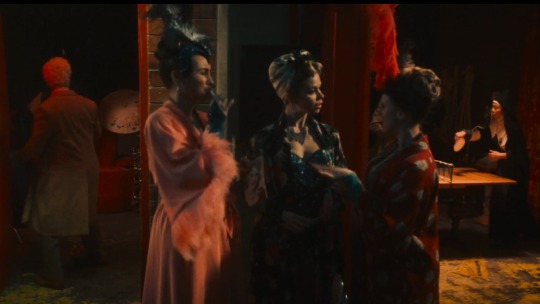
The nightingale
January means one thing: absolutely no migratory birds in Europe yet. They’re blissfully wintering in the warm sun of Northern Africa at the time. But, ironically, when the real nightingales flew off, a certain song about them suddenly gained popularity in the West End of London.
It might be a shock, but A Nightingale Sang in Berkeley Square wasn’t a hit from the start — even though its creators, Eric Maschwitz and Manning Sherwin, were certainly established in their work at this point. The song was written in the then-small French fishing village of Le Lavandou shortly before the outbreak of the Second World War with first performance in the summer of 1939 in a local bar, where the melody was played on piano by the composer Manning Sherwin with the help of the resident saxophonist. Maschwitz sang his lyrics while holding a glass of wine, but nobody seemed impressed. It took time and a small miracle to change that.
Next year, the 23-year-old actress Judy Campbell had planned to perform a monologue of Dorothy Parker’s in the upcoming Eric Maschwitz revue „New Faces”. But somehow the script had been mislaid and, much to her horror, replaced with the song A Nightingale Sang in Berkeley Square. She had never professed to be a singer but even so, she gathered her courage and went out onto the moonlit set dressed in a white ball gown. Her heartfelt rendition of the now evocative ballad captured the audience’s imagination and catapulted her West End career to stardom.
It was precisely 11 April 1940 at the Comedy Theatre in Panton Street and the revue itself proved to be a great success — not only it kept playing two performances nightly through the Blitz, but also returned the next year. And the still operating Comedy Theatre is mere five minutes on foot from the Windmill Theatre, where Aziraphale performed in 1941, and not much longer from his bookshop.
Now, most Good Omens meta analyses focus on Vera Lynn’s version of the song from 5 June 1940, but it didn’t get much attention until autumn, specifically 15 November, when Glenn Miller and his orchestra published another recording. And Glenn Miller himself is a huge point of reference in Good Omens 2.
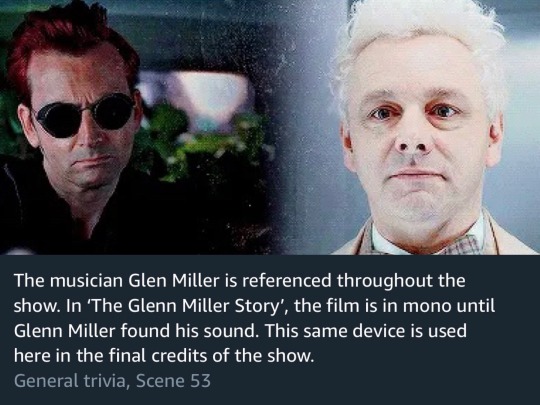
According to the official commentary the infamous credits scene is establishing Aziraphale and Crowley’s final resolve for the next season using the same narrative device The Glenn Miller Story (1954) does in its most crucial scene. It starts with the tune (and audio in general) totally flat, then adds a piano on one side, and gradually becomes fully multidimensional. The Good Omens credits not only emulate the same sound effect, but bring it to the visual side of the narrative by literally combining the individual perspectives of the two characters together. Even though they’re physically apart, their resolve — and love to each other — brings them even closer than before. Aziraphale smiles not because he’s being brainwashed, but because he knows exactly what to do next.
Some of you might have noticed that Tori Amos’s performance for Good Omens is actually a slightly shortened version of Miller’s recording — much less sorrowful than Vera Lynn’s full lyrics that include i.a. this bridge:
The dawn came stealing up
All gold and blue
To interrupt our rendez-vous
I still remember how you smiled and said
Was that a dream or was it true?
Which is a huge hint when it comes to what we can expect from the main romantic plot line in the Good Omens series. The original song introduces an element of the doubt — it seems like there was no nightingale at all, only the mirage woven by the singer clearly intoxicated with love, much like Aziraphale and Crowley for the length of the last six episodes. Crowley’s comment in the season finale might allude to that interpretation, stating that there are no nightingales — never have been. It was all a dream. But the version we’re working with here is short and sweet, and devoid of that doubt. In the Good Omens universe angels were actually dining at the Ritz, the streets were truly paved with stars (or will be shown as such in the next season), and a nightingale really sang in Berkeley Square, as the omniscient, omnipresent, and omnipotent narrator, God Herself, had shown us.
All in all, it’s not an accident that the “modern” swing ballad activating Aziraphale’s memory and opening the 1941 minisode is the Moonlight Serenade by Glenn Miller. It’s a track naturally associated with A Nightingale Sang in Berkeley Square when it comes to music style and the sentiment in the lyrics.
But why the sudden popularity? In the great uncertainty and hardship of the Blitz, A Nightingale Sang in Berkeley Square provided solace and escapism for listeners, offering a glimpse of hope and love amidst the darkness of war. It became a universal anthem of resilience and a reminder of the power of love transcending difficulties. By January 1941 the whole city knew this tune by heart, including a certain West End aficionado with a cabinet full of theatre programs in his bookshop. Thanks to Maggie’s grandmother, he most probably had a record at hand to play during his spontaneous wine night with Crowley. We can only suspect the details, but it was was mutually established as their song exactly at that time or soon afterwards. Pretty sure we will see a third installment of that minisode for many, many reasons, but especially because of this “several days in 1941” answer by Neil:
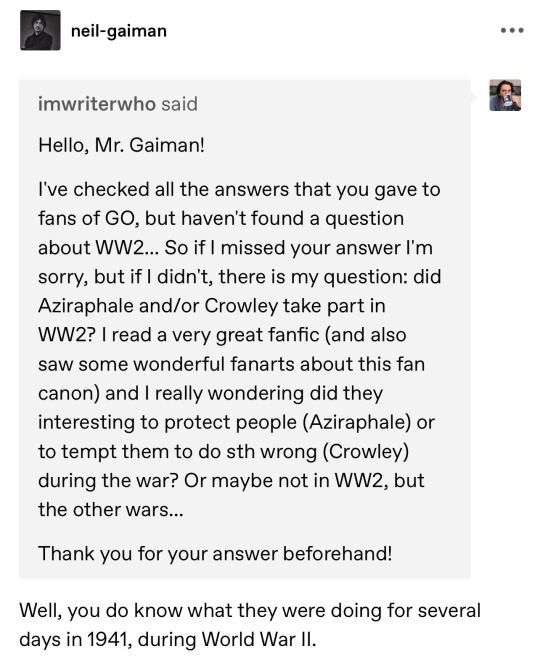
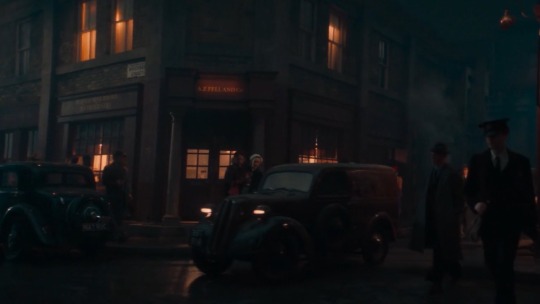
The Man Hunt
In 1941 A Nightingale Sang in Berkeley Square gained even more popularity as the romantic theme of the Fritz Lang’s newest film Man Hunt. The 1939 story by Geoffrey Household first appeared under the title “Rogue Male” as a serial in the Atlantic Monthly Magazine where it received widespread comment, soon becoming a world-wide phenomenon in novel form. Its premise criticizes Britain's pre-war policy of appeasement with Germany, ready to sacrifice its own innocent citizens to the tentative status quo. Sounds a bit like Heaven's politics, right?
Yes, I'm trying to make you watch old movies again — like all the other classics, Man Hunt (1941) is easily available on YouTube and other streaming websites.
The next part will include spoilers, so scroll down to the next picture if you prefer to avoid them.
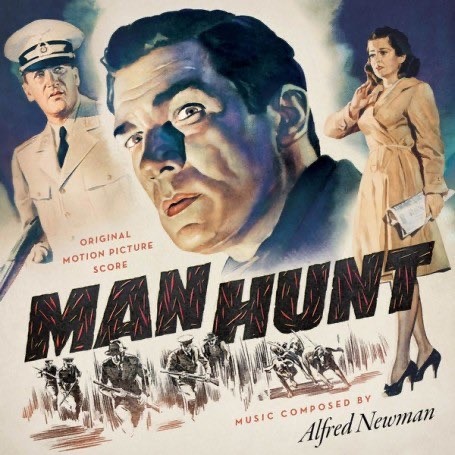
The plot of the movie seems simple enough: the tall, dark, and handsome Alan Thorndike, who nearly assassinates Hitler, narrowly escapes Germany and back in London continues to evade the Nazi agents sent after him with the help of a young trench-clad “seamstress” named Jerry, bridging the class divide and becoming unlikely friends-partners-romantic interests. It doesn’t end well though.
Jerry's small London apartment serves as a hideout for Alan when he was being followed by Nazis, similarly to how Aziraphale's bookshop is a safe haven for both Crowley and Gabriel in S2. She helps the man navigate the streets and eventually out of London — by sacrificing herself and getting forcefully separated from him by a patrolling policeman. The last time they see each other, Alan watches Jerry look back at him yearningly and disappear in the fog, followed by the elderly officer.
Unfortunately in the next scene we learn that the latter is a Nazi collaborator and helps the agents apprehend Jerry in her own flat. Staying loyal to her love and uncooperative, she’s ultimately thrown out of a window to her death, but posthumously saves Alan once again — through the arrow-shaped hatpin he gifted her earlier that is presented to him as the evidence of her off-screen fate.
Long story short, thanks to Jerry’s sacrifice Alan not only survives, but is able to join the war that broke out in the meantime and go back to Germany, armed with a rifle and a final resolve to end what he started, no matter how long will it take. The justice will be served and the dictator will pay with his life for his sins.
I wouldn’t be myself without mentioning that the main villain has a Roman chariot statue similar to the one in Aziraphale’s bookshop, an antique sculpture of St Sebastian (well-known as the gayest Catholic Saint) foreshadowing his demise, and a chess set symbolizing the titular manhunt/game of tag with the protagonist.
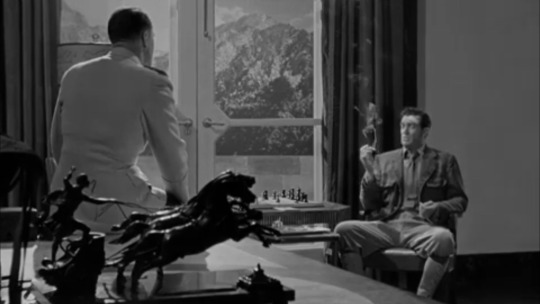
Aziraphale’s song
Will Aziraphale sacrifice himself as well? Or has he already? If his coin magic trick can be any indicator, we should expect at least a shadow of a danger touching the angel’s wings soon.
Let’s sum up the 1941 events from Aziraphale’s perspective: the very first time they’ve interacted after almost a century, Crowley actively sabotaged his entire existence twice by stepping onto a holy ground and by being outed by agents of Hell, both on the very same night and both because of his undying dedication to the angel. That’s enough of a reason not only for performing an apology dance, but also maintaining a careful distance for Crowley’s sake for the next 26 years. Only when he heard that his idiot was planning to rob a church, he gave up since he “can't have him risking his life”.
That’s when Crowley, sitting in a car parked right under his bookshop, offered him a ride. It wasn’t even subtle anymore. It was supposed to be a date, this time both of them understood it. But Aziraphale wouldn’t risk Crowley’s safety for his own happiness, especially not when he can name his feelings towards him and knows that they are reciprocated — the biggest lesson he learnt back in 1941.
So he did what he’s best at, he cut Crowley off again, but this time with a promise of catching up to his speed at some point. Buddy Holly’s Everyday, which was originally planned to play afterwards instead of the Good Omens theme, adds additional context here:
No, thank you. Oh, don’t look so disappointed. Perhaps one day we could... I don't know… Go for a picnic. Dine at the Ritz.
Aziraphale, carefully looking around and feeling observed through the whole conversation in the Bentley, consciously used the “Dine at the Ritz” line from A Nightingale Sang in Berkeley Square, from their song, as a code only the two of them understand. Not as a suggestion to go out for a meal, but a promise. A hope for the privilege of being openly in love and together — maybe someday, not now, when it’s too dangerous — even if it leads to a bad ending.
Fast forward to 2023 when for one dreadful moment Crowley’s “No nightingales” robbed Aziraphale even of that semblance of hope. He looked away, unable to stop his tears anymore. Only their kiss helped him pull himself together and make sure that a nightingale did sing the last time he turned — just like in their song — this time without a smile, as a goodbye.
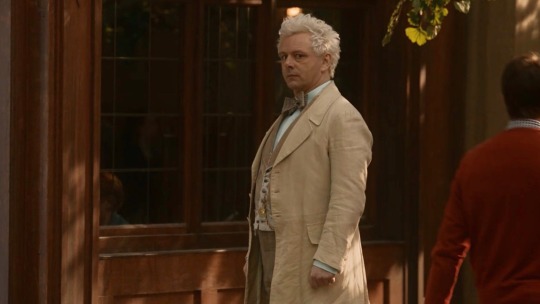
#a nightingale sang in the london blitz#the song is a code#and is miracled as a sign#aziraphale needs a hug#no nightingales#history rant#yuri is doing her thing#the good omens crew is unhinged#neil gaiman#st dunstan-in-the-east#1941 minisode#1941 flashback#a nightingale sang in berkeley square#good omens#good omens meta#good omens 2#go2 meta#go2#ineffable husbands#aziraphale#crowley#1941 aziraphale#1941 crowley#the blitz#man hunt (1941)#the glenn miller’s story (1954)#why am i like this#why do i do this to myself#long post
320 notes
·
View notes
Text
Re: Pervertin or how German Supersoldiers High on Crack travelled through Space and Time Buy my Book

I came across a post on the bird site yesterday calling into attention the use of pervitin, more or less adderall, among German troops during WW2. For context pervitin tablets were indeed issued to a lot of military personnel back in those days, specifically to aircraft pilot and sometimes tank crews on long missions. The drug as some of you may have heard keeps you awake and alert, along with a slew of side effects and a non negligible chance of addiction.
In a discussion that brought to view just how willing people are to buy into Nazi propaganda in the year of our f*cking lord 2023, I pointed out a few things, uphill and having to indulge a lot of sidetracking.
The use of pervitin has always been a little overstated ever since it came to the internet's attention, and I certainly would never call it a key component of the Blitzkrieg when, in the theaters of war where actual Blitzkrieg was employed, its success was more due to a combination of innovative doctrines, intact fuel supplies and a big fat helping of dumb luck. It was a bold move highly relying on capturing enemy fuel depots with fast, surprise deep strikes supported by a lot of armored and air forces, and it was only sustainable in neighboring, industrialized countries.
One can argue if the USSR was industrialized at the time, but it stopped mattering when the Russians removed their entire industry from the West to beyond the Ural mountains. The Blitz stalled there.
"But if it didn't work, then why did the Nazis do it so often ?"
Well the answer to that is twofold. The first, longer answer is that Nazis were a bunch of f*cking morons. Maybe not one by one, but as a government in charge of military procurement, they were one bunch of goofy motherf*ckers. Gaggle of functional shit-for-brains really.
The Nazis gave every one of their tanks in the middle of the war two coats of anti-magnetic paint, which took almost a full day to cure, despite being the only major nation to use magnetic antitank mines. The Nazis kept using slave labor drawn from their prisoners of war, including in the manufacturing of their overengineered armored vehicles, resulting in poor quality products or, you know, a few rivets in your magnificent Tiger tank being replaced by a cigarette butt. The Nazis spent more than half the cost of a strategic bomber on every V2 rocket, not including design costs, for less than half the payload. It ended up killing more Germans and slave workers than British people in London, for literally no strategic or tactical result with 0.4 person killed per every rocket.
The second, shorter answer is that pervitin was not used that much. A lot of the arguments trying to boost its importance come from a single book, "Blitzed" by Norman Ohler, now available in twenty languages apparently, where grand claims are made by a historian who was probably more than a little tired of seeing Buzzfeed rack in the big bucks instead of him.
End note; I was called out by a bird siter after the conversation that inspired this post for even beginning to fact-check this, which they considered, and I quote, "fangirling over nazi stats". I cannot stress this enough, learning the 'bad' parts of history does not make you bad person, it is how you interact with the resulting knowledge. Unlike what they implied, I had to look for those supporting evidence. I had a hunch that such a grabbing headline about super-drugs would be fake, I knew offhand that V2 rockets killed more blues than reds, but when I had to research all that jazz about Nazis and their superweapons it was to dunk on them, not make another History Channel documentary about a time-travelling bell.
Stay critical, fascists can eat shit.
842 notes
·
View notes
Note
have you ever considered the possibility of Tintin being in the wars? He’s Belgian, about 17 and smack bang in the right era for him to be involved?
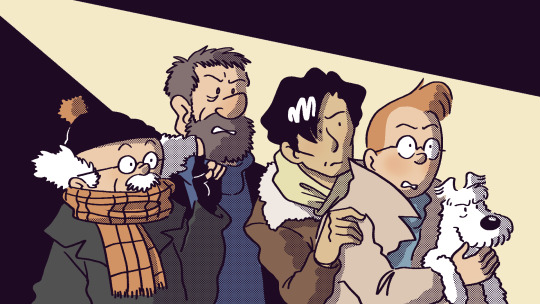

I actually have done a story set during WW2, where a 25 year old Tintin goes to London during the Blitz in 1940! It’s right here.
The canon comics follow a floating timeline even when they reference real historical events. My headcanon timeline has Tintin's first adventure in 1929 (when the comics debuted) when he was 14, placing his year of birth at 1915, towards the start of WW1. I know a lot of people lied about their age to enlist but I highly doubt a newborn could pull this off, even if that newborn is Tintin.
As for WW2, Belgium was neutral for some time until Germany invaded in 1940. Tintin and the Marlinspike team are pretty proactive and would absolutely despise fascists, so I can imagine them taking things into their own hands! In my timeline he also is publicly outed as gay by a tabloid and loses his job, so I doubt the army at the time would have taken him. I might have to look this up though.
I want to do a series of stories during this period - Herge himself wasn't able to directly criticise the Nazis (he made attempts through allegory such as in King Ottokar's Sceptre) and there is some apologism evident in his work. Because of censorship there weren't any contemporary direct references to WW2 in stories published at the time - I'm just some idiot on the internet who doesn't have these restrictions so why not have Tintin punch some Nazis now? It’s only in character.
#asks#tintin#Adventures of Tintin#captain haddock#archibald haddock#professor calculus#cuthbert calculus#snowy#milou#chang#fanart#ww1#ww2#animation#gif#nazi cw
649 notes
·
View notes
Text
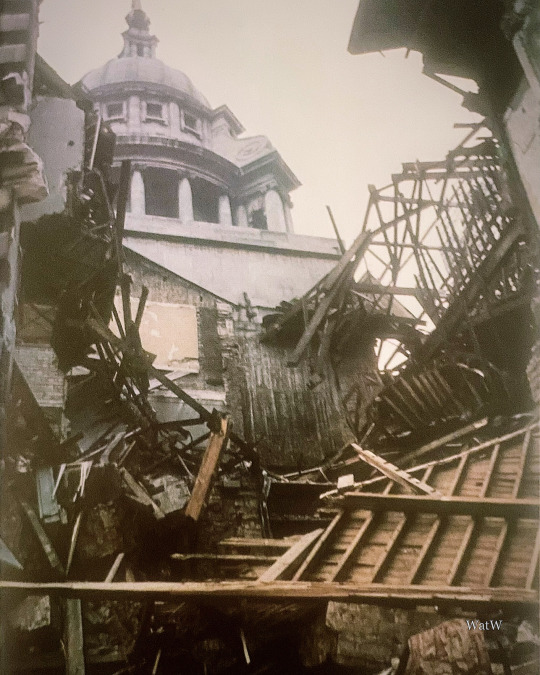
A photo of the Old Bailey from a destroyed building after it narrowly missed being destroyed itself during a particularly heavy German raid - London, England, Oct 1940
#world war two#1940s#worldwar2photos#history#ww2 history#ww2#wwii#world war 2#ww2history#wwii era#old bailey#1940#the old Bailey#London#England#great britain#air raid#the blitz#the Battle of Britain
78 notes
·
View notes
Text
In case anyone wants some scholarly data on the bombing-growth impact, I can provide some good ones. The "bombing didn't impact growth in Germany & Japan" is too well known to bother with; I find this Vietnam paper better, as Vietnam was poorer, bombed more intensely, and most importantly bombed very regionally due to weird political factors; its the best 'experiment' of the impact of bombing on wealth, health, education, etc. And its all zeros; the capacity of humanity to survive the worst modernity can throw at them and rebuild is truly marvelous.
I will also share my favourite results ever in a paper; the areas of London that were bombed during the Blitz are generally the richest areas of London, as the need to rebuild wiped away NIMBY stakeholders and allowed, taller, better buildings to be constructed. London *would be poorer today if it had not been bombed during WW2* is a galaxy brain take that is actually correct, amazing:
I think the last one is illustrative, though - all capital is temporary. When people talk about the "agglomeration of capital", it can invoke ideas of building stocks of factories and tools and vaults of gold or whatever that generate wealth indefinitely, but that doesn't happen. Those factories shred, degrade, become outdated, need to pivot, etc in a matter of years. The economy has to be perpetually worked to generate value. "Agglomeration of capital" is not a stock of permanent wealth, its a stock of present wealth that gives you the power to dictate future wealth and its construction. And most of that wealth is the human capital, the org structures, the commercial relations. The buildings and tools are always cheap in comparison to those. Which is why bombing doesn't impact long run ecomic growth.
342 notes
·
View notes
Text
even by Dec 2023 - the bombing of Gaza had surpassed the bombing of Dresden and Cologne in WW2

Israel's Gaza bombing campaign is the most destructive of this century, analysts say (archive.org)
Israel Defence Forces (IDF) said that it had conducted MORE THAN 10,000 airstrikes on Gaza as of Dec. 10. [...] Israel's main strike aircraft are capable of carrying 6 tons of bombs each.
THATS APPROX. 60,000 TONNES
For context, London was hit with an estimated total 19,000 tons of bombs during the 8 months of the Blitz, and the atomic bomb that destroyed Hiroshima was equivalent to 15,000 tons of high explosive.




In just two months, the bombing has killed one per cent of Gaza's entire population. Allied bombing of Germany, by comparison, killed a smaller percentage of the German population over the course of the entire Second World War.

#free palestine#palestine#gaza#from the river to the sea palestine will be free#glory to the martyrs#long live palestine#long live the resistance#death to israel#death to america#israel#america#war crimes#world war#world war 2#dresden#cologne#hamburg#germany
24 notes
·
View notes
Text
That September day would go down in history as Black Saturday, and what followed as 'the Blitz'.
"Humankind: A Hopeful History" - Rutger Bregman
#book quote#humankind#rutger bregman#september#black saturday#the blitz#britain#london#ww2#world war 2#wwii#world war ii#second world war#world war two#nonfiction
1 note
·
View note
Text
What I learnt by BBC regarding the Blitz in London - 1941
Due to the fact that I'm not a UK citizen, I knew very little about the London Blitz. I was more familiar with the Blitzes in my own country.
Everything I know now about it derives from two specific TV shows produced by the BBC, which, of course, is a reliable source. It is the national broadcasting service, isn't it?
First of all, I'd like to talk about the military conditions in London. The technological advancements in WW2 were quite crucial for the war's resolution, as seen with the invention of sonar and the alleged attempt to use Daleks in the war. In fact, Churchill was supposedly preparing Daleks to win the war, exploiting the knowledge of these human-shaped robots sent by some very cruel aliens.

Nevertheless, they were hardly bothered by the presence of a mysterious time traveler who parked his spaceship in front of Big Ben (which sonars could not identify because it was hidden). Additionally, some German air bombers mysteriously changed direction towards a different London area, killing two Nazi spies and destroying a church. Nobody investigated this sudden plan shift, possibly due to the effectiveness, albeit chaotic nature, of the British secret service.
Regarding the social conditions, London's common folk lived miserably, with many orphans around. Health conditions were delicate, with rare and sparse evidence suggesting the presence of Nazi zombies walking in Soho. The cause of this illness remains unclear, but it is assumed that indigenous people were immune to it, while Germans were not.
Meanwhile, a virus spread around the town causing people to repetitively say, "Mooommy? Are you my moooommy?" A doctor was able to heal them all with nanogenes provided by the same mysterious time traveler parked in front of Big Ben. We lack evidence of the technology or scientific research used, although it was likely based on DNA recognition, officially discovered only years later. We can assume some experiments were ongoing.
The situation was not the same for the medium/high class. Common bookshop owners could be hired as spies or become alcohol smugglers to maintain their lifestyle, such as being well-dressed and driving old-fashioned cars. Their discontent manifested in partisan actions against the Hitler regime. This anti-germany feeling was expressed expecially with clothes, by refusing to wear black clothes or wearing the Union Jack.
Despite the war conditions, London's cultural life remained flourishing and lively. US GIs entertained themselves by watching ladies and magicians perform one of the most successful magic tricks in history: the bullet catch, with the best representation held by Fell the Marvellous and an unknown gunman.

Due to the social inequities, food was in short supply, while toy and magic trick shops ran their businesses proficiently. Rare book selling was also a profitable way to survive, due to the high demand for ancient books, especially those containing prophecies.
At the end of the Blitz, the number of victims remains unclear. However, a famous sentence by a (medical?) doctor is reported: "Everybody lives, Rose! Just this once!". This interpretation is supported by the evidence of a demon and an angel making a toast. So, it ended well.
Thank you for your attention.
Can't wait to send this to my former high school history teacher.
7 notes
·
View notes